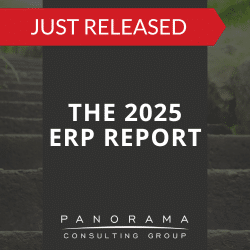- Multi-cloud ERP systems offer flexibility and scalability but come with significant challenges, including security concerns, performance issues, and cost complexities.
- Without proper planning, multi-cloud ERP deployments can lead to failures that disrupt operations, requiring expert analysis to identify and resolve root causes.
- Challenges like latency, integration issues, and vendor coordination can undermine system functionality, but ERP consultants can provide solutions to enhance performance.
- Redundancies, opaque pricing, and scaling inefficiencies in multi-cloud environments can strain budgets, but strategic cost governance frameworks can mitigate these risks.
- By addressing these challenges head-on, organizations can unlock the full potential of multi-cloud ERP, achieving operational agility, resilience, and access to best-in-class cloud services.
The idea of multi-cloud ERP deployments is alluring: enhanced scalability and access to a broad suite of services across multiple cloud providers.
For executives tasked with overseeing their organizations’ digital transformation, the multi-cloud model represents a chance to unlock operational agility while future-proofing the business. Yet, alongside these advantages come significant challenges—ones that require strategic foresight, robust planning, and ongoing adaptation.
Today, we will explore the multifaceted challenges of multi-cloud ERP deployments, emphasizing critical aspects such as security concerns, performance optimization, and cost management.
Understanding the Multi-Cloud ERP Landscape
The shift to multi-cloud ERP isn’t just a technological trend—it’s a response to the evolving needs of modern enterprises. Organizations now demand ERP systems that are modular, flexible, and capable of supporting diverse workloads.
Multi-cloud ERP solutions deliver this by leveraging the strengths of multiple providers, offering advanced capabilities in AI-driven insights and scalability in distributed operations.
However, this very flexibility introduces complexities. Unlike single-cloud ERP systems, which benefit from unified architecture and standardized processes, multi-cloud environments require enterprises to juggle divergent platforms, policies, and technical frameworks.
This fragmentation amplifies challenges related to security, performance, and cost management. When not addressed properly, these complexities can lead to ERP failures, which not only disrupt operations but also risk long-term reputational damage.
In a worst case scenario, organizations find themselves in legal battles, relying on computer software expert witnesses to review project documentation and provide courtroom testimonies.
Contemplating litigation?
We have multiple software expert witnesses available for provision of reports, depositions, and testimonies.
Key Challenges of Multi-Cloud ERP Deployments
1. Security Concerns
Challenges include:
- Data Breaches and Vulnerabilities: Sensitive ERP data is dispersed across multiple platforms, increasing the risk of exposure. Without cohesive security measures, gaps can emerge between providers, leaving businesses vulnerable to breaches. Security lapses are often a root cause of ERP failures, particularly in industries that handle highly sensitive information.
- Regulatory Compliance Complexities: Many industries are governed by strict compliance standards. Ensuring compliance across multiple jurisdictions and providers can lead to significant administrative overhead. Non-compliance often contributes to high-profile ERP failures that attract legal scrutiny.
- Insider Threats: The sheer number of access points in a multi-cloud ERP environment heightens the risk of internal misuse, whether intentional or accidental. Without centralized monitoring, tracking user activity becomes challenging, increasing the likelihood of unauthorized data access.
Expert Tip
To mitigate these risks, consider engaging ERP consultants who specialize in cloud security frameworks. These experts can help design unified security strategies and ensure compliance with industry regulations across all cloud platforms.
2. ERP Performance Challenges
The performance of your ERP system directly impacts productivity, decision-making, and customer satisfaction. However, ensuring consistent ERP performance in a multi-cloud environment is far from straightforward.
Challenges include:
- Latency Issues: Multi-cloud deployments often require data to travel between geographically dispersed servers. Without proper configuration, this can result in latency, which undermines the real-time capabilities of ERP modules. Performance lags in critical applications, such as supply chain systems, can lead to operational disruptions.
- Integration Difficulties: Multi-cloud ERP systems rely heavily on APIs to enable seamless communication between platforms. Poorly managed APIs can lead to system outages, data synchronization issues, and reduced functionality.
- Vendor Coordination Challenges: When performance issues arise, pinpointing the source becomes challenging. Cloud providers may shift blame to one another, leaving enterprises caught in a cycle of inefficiency and finger-pointing.
Expert Tip
During the ERP evaluation process, look for vendors with proven interoperability. Using AI in ERP systems can also help optimize system performance by predicting bottlenecks and automating workload distribution. For organizations facing recurring performance issues, engaging an ERP consultant can help uncover systemic flaws and provide actionable insights for improvement.
3. Cost Management
Multi-cloud ERP environments offer flexibility but often at a steep cost. Without proactive cost management, organizations may face escalating expenses that erode ROI and strain budgets.
Challenges include:
- Overlapping Costs: Redundancy in services—such as storage or network bandwidth—can lead to unnecessary spending. Organizations frequently pay for similar functionalities across multiple cloud platforms, unaware of cost-efficient alternatives.
- Opaque Pricing Models: Cloud providers often use complex pricing structures that make it difficult to forecast costs. This lack of transparency creates challenges in budgeting and long-term financial planning.
- Scaling Inefficiencies: While cloud services are designed to scale, unplanned growth can result in resource over-provisioning. For example, scaling ERP modules for peak performance during seasonal demand may leave resources underutilized during off-peak periods, creating cost inefficiencies that erode ROI.
Expert Tip
Partner with an ERP consulting company to implement a cost governance framework. These firms can conduct ERP comparisons to highlight cost-effective solutions and help optimize resource allocation to prevent unnecessary expenses.
The Benefits of Addressing Multi-Cloud ERP Challenges
While the challenges of multi-cloud ERP deployments are significant, a multi-cloud approach can have numerous benefits:
- Enhanced Resilience: By diversifying cloud providers, your organization reduces its dependency on a single vendor, mitigating risks associated with outages or service disruptions.
- Access to Best-in-Class Services: Multi-cloud ERP systems enable enterprises to cherry-pick the best services from different providers, ensuring that each business function benefits from cutting-edge capabilities.
- Operational Agility: A well-orchestrated multi-cloud ERP environment supports rapid innovation, allowing organizations to respond to market demands with speed and precision.
Turn Cloud Challenges into Opportunities
While the challenges of multi-cloud ERP deployments are formidable, they present an opportunity to build a stronger, more resilient enterprise.
The mission is clear: lead with strategic foresight, embrace expert guidance, and address security, performance, and cost challenges with precision.. With the right approach, multi-cloud ERP can become a cornerstone of operational agility and long-term growth. Contact us below for a free ERP consultation.














